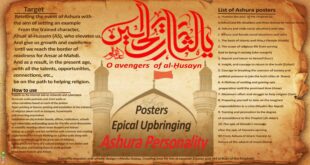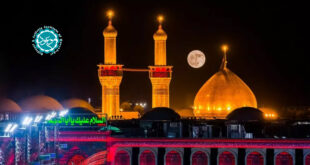His Worship:
History is replete with news and narrations which talk about the Holy Imam’s worship and piety. Among them are:
1. Muhammad Shakiri said: He[Holy Imam (A.S.)] used to sit in his prayer niche (mihrab) and start prostrating, then, I slept. When I woke up, I saw him still prostrating(Sajdah).”
2. Kulaini, quoting another narration which talked about the Holy Imam’s worshipand piety and how he spent his time in Abbasid prison in Samarra praising, worshipping and devoting himself to Allah, the Almighty, to the extent that he[Holy Imam (A.S.)] even had an impact on his own jailer, said:
“The Abbasids went to Salih bin Wasif when Abu Muhammad (Imam Hassan al-Askari(A.S.)), peace be on him, was imprisoned. They told him: “Be hard on him. Don’t give him any ease.’ “What can I do with him?” Salih asked them. ‘I entrusted two of the most evil men I found (to guard the Imam). These two men became (men) of worship, prayer and fasting to an amazing extent.’ Then, he ordered these two men who were in charge of Imam Hasan al-Askari(A.S.)) to be present. He told them: ‘Shame on you! What is your involvement in the affairs of this man (i.e. the Holy Imam)?’ They answered: “What can we say about a man who fasts at day and stands (in prayer) at night, who does not speak, and occupies himself with nothing except worship? When he (the Imam) looks at us, our limbs shake and within us in (a feeling) which we have never had. When the Abbasids heard this, they all left in despair.”
The deterioration of the adminstrative, moral and political conditions of the Abbasid authorities. The life of extravagance and entertainment dominated the Abbasid palace in Samarra. In return, poverty, hungry, sickness and terrorism prevailed everywhere. All these circumstances caused the Holy Imam (A.S.) to oppose and confront them with the help of the descendants of Ali bin Abi-Talib (A.S.) by a revolution in order to save the Ummah from such disturbance and unrest.
Therefore, the Abbasid authorities, especially the authority of Mu’taz and Muhtadi, Mu’tamid endeavoured to confront the Holy Imam(A.S.) through confinement, terrorism, prison, and siege.
Imam al-Askari(A.S.) and Political Conditions:
We have mentioned in previous chapters about the Abbasid rulers and their oppression, corruption, dispersion and weakness. The Holy Imam (A.S.) lived during the caliphate of Mutawakkil, and his two sons, Muntasir and Musta’in. He (A.H.) undertook the task of divine leadership after his holy father’s martyrdom in 253 A.H. during the reign of the Abbasid caliph, Mu’taz. The Abbasid caliph Mu’taz who was dismissed from the office in the year 255 A.H. by his collaterals and, then, they put him in prison until he died.
After him, the caliph Muhtadi Abbasi took the office of the caliphate. This man, also, faced the same destiny. They attacked him, wounded him and called him to be deposed, but, he refused and after two days, he died in the year of 256 A.H.
Regarding the conditions of the people, historian quoted that an epidemic spread about in Iraq in the year of 258 A.H. and during which more that ten thousand people died of starvation. Poverty and high costs spread severely in different lands. For example, the high cost in Mecca caused people to leave for areas surrounding Madina and other lands… in Baghdad, the prices of essential commodities, also, increased…”
Ya’qoobi quoted another narration:
“The prices were so expensive in Baghdad and Samarra’ that ever hasp (fastener) cost one hundred dirhams. Wars continued and during which, provisions were cut off wealth decreased…”
As the society suffered poverty, hunger, and sickness, the unrest caused by the autority, and mismanagement, the palaces of the caliphs filled with slave girls, the playing with jewels, extavagance, lavish gifts and dissolute entertainment. This gives us clues about the life of the Abbasid palace which contained such playing and vanities to the extent that some caliphs mocked each other, thus, disclosing various scenes of vanity and extravagance and playing with the treasury, the situation was so deteriorated that the personal possessions of some of their women and their yearly expenditures were millions of dirhams.
In this regard, the following is mentioned:
“The mother of Muhammad bin Wathiq, the caliph died who before he was given the pledge of allegiance, came under the care of Musta’in. When the caliph Musta’in was assassinated, Mu’taz had her live in the palace of Risafa in which his wife was living. When Muhtadi undertook the office of the caliphate, one day, he addressed a group of his supporters, saying: “Regarding myself, I have no mother to whom I need ten million dirhams, yearly, in order to spend on her slaves and servants related to her…”
The books of history quote that Qabiha was a slave girl of the Caliph, Mutawakkil and a slave-wife of his son, Mu’taz. She transferred her properties from Baghdad to Samarra’ and continued selling her treasuries for many months. She possessed, in one of her rooms, a millions dinar and jewelry equal to the cost of two millions dinars.
The Holy Imam(A.S.) Face to Face with the Oppressors
The Abbasid authorities persecuted Imam Hasan al-Askari(A.S.) and put him under their control in order to paralyze his political and ideological activities and also restrain him from practising his leading role among the Ummah. Therefore, the Holy Imam (A.S.) was obliged to act secretly and built an organization of his followers, and representatives and strengthened its base. By studying historical documents, available at hands, one can clearly detect the following procedures:
1. Abu Hashim al-Ja’fari, on the authority of Dawood bin Aswad, the stoker of Abu Muhammad (a.s.), is quoted to have said:
“One day, my lord, Abu Muhammad, [i.e. Imam al-Askari(A.S.)], called me and handed to me a threshold, which seemed very heavy. He (a.s.) told me to take it to Amri. Therefore, I started out, but on the way a water carrier with a mule advanced towards me. His mule approached me on my way and the water carrier called to me to shout it back to him. Instead, I hit it with the threshold and started beating it. As a result, the board split and I looked at it and found books inside it. So, I hastened to the thereshold and held it under my sleeve. The water carrier started carying, and cursing me and my owner. When I approached the house of my Lord, upon returning, the Imam’s servant, Isa received me at the door and said: “My master has asked you: Why did you beat the mule and break the threshold?” I answered him: “O my master! I did not know what was in it. He (A.S..), then, said: “Why did you do an action and then apologize for it. Be careful not to repeat it, again, from now on, When you hear someone cursing us, go on your way on which you are ordered. And be aware not to answer someone who curses us or introduce yourself. Because we are in an evil land, go on your way. Your news and conditions reach us, so be aware of that.”
 Mouood Mouood English Edition
Mouood Mouood English Edition




